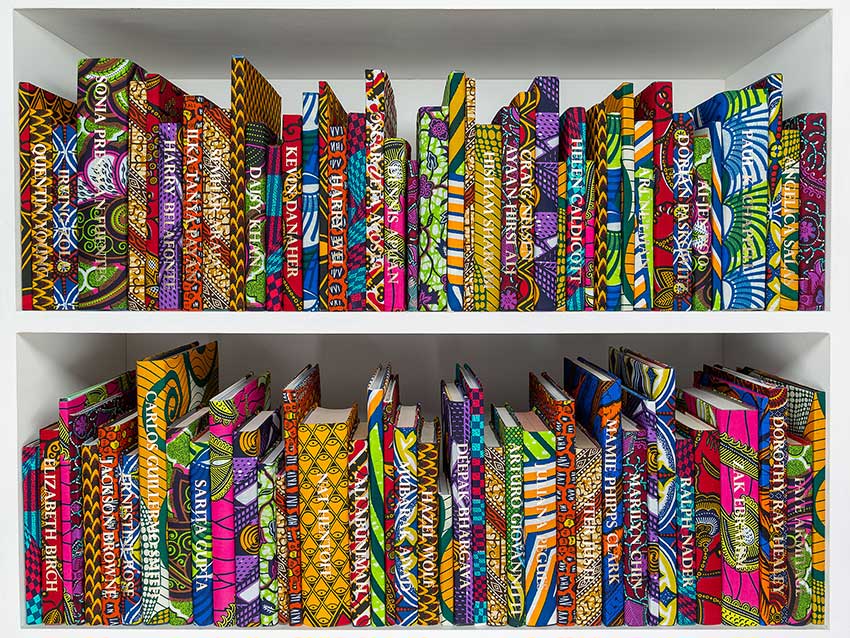
“Yinka Shonibare’s library highlights the vital, complex, and important contributions of American immigrants, and the descendants of immigrants, who brought forward ideas that represent a spectrum of social and political thought,” said David E. Little, Director and Chief Curator of the Mead Art Museum. “Touching on current debates on immigration, the artist invites viewers to consider the varied people and cultural sources that inform our sense of history and culture, and shape our perceptions of our own place within it. With brightly-colored fabric, Shonibare presents to us the names of activists whose ideas may appeal to us—or appall us.”
Also this fall, the Mead will host a debate among Amherst College faculty on the subject of the global migration of people, commodities and ideas, for which the Shonibare work will serve as the starting point. The debate—which will serve as a model for how students can facilitate constructive discussion of sensitive topics—will bring together faculty from American studies, economics, political science, and other disciplines. The debate will take place as part of the public opening for the Shonibare installation, from 5-7pm on October 30.
The Mead’s acquisition of The American Library Collection (Activists) is part of ongoing initiatives that unearth and explore the multiple, often hidden narratives found throughout the history of art and ideas, and help audiences connect those to present-day challenges facing different communities. Shonibare’s work will go on view as part of the fourth iteration of the Museum’s Rotherwas Project series of focused installations. The Rotherwas Room, a carved walnut- and oak-paneled room, was originally built for Rotherwas Court, the estate of English knight Sir Roger Bodenham. It was given to the Mead and incorporated into the Museum’s building when it was constructed in 1949. As an historic, site-specific installation, it makes a statement about a sense of Anglo-Saxon authority—and, as such, serves as an exceptional environment for the presentation of contemporary art, encouraging audiences to ask questions about how we perceive and interpret history and culture. The new exhibition will be curated by Little and will include examples of other libraries of notable musicians and artists.
Shonibare’s work was created as a commentary on how literature can knit together disparate points of view—and how such intellectual processes can also serve to normalize extremist perspectives. It contains the names of American writer-activists from across the political spectrum, including:
Mary McLeod Bethune (1875-1955)
Grace Lee Boggs (1915-2015)
Pat Buchanan (1938- )
Cesar Chavez (1927-1993)
Eldridge Cleaver (1935-1998)
David Duke (1950- )
Nathan Bedford Forrest (1821-1877)
Emma Goldman (1869-1940)
Gordon Kiyoshi Hirabayashi (1918-2012)
Sarumathi “Saru” Jayaraman (1976- )
Jacob Riis (1849-1914)
Linda Sarsour (1980- )
Sonia Sotomayor (1954- )
Jared Taylor (1951- )
In addition to the wrapped books, the collection comes with a bookshelf designed by the artist and a card catalog of names from the included books. The work is an extension of the artist’s 2017 series The American Library Collection, which included other groupings, such as (Politicians), (Filmmakers), and (Scientists).
“At a time when questions of academic and intellectual freedom can be so contentious on college campuses and in the mass media,” Little said, “bringing this work to Amherst College supports our ongoing efforts to embrace open debate and discussion and seek ways in which art and artists can support these conversations. We are grateful to the donors who have made possible this important acquisition.”
Support for this acquisition was provided by the William K. Allison ’20 Memorial Art Fund, the Wise Fund for Fine Arts, the Mead Art Acquisitions Fund, and the Charles H. Morgan Fine Arts Fund.
Mead website: amherst.edu/mead